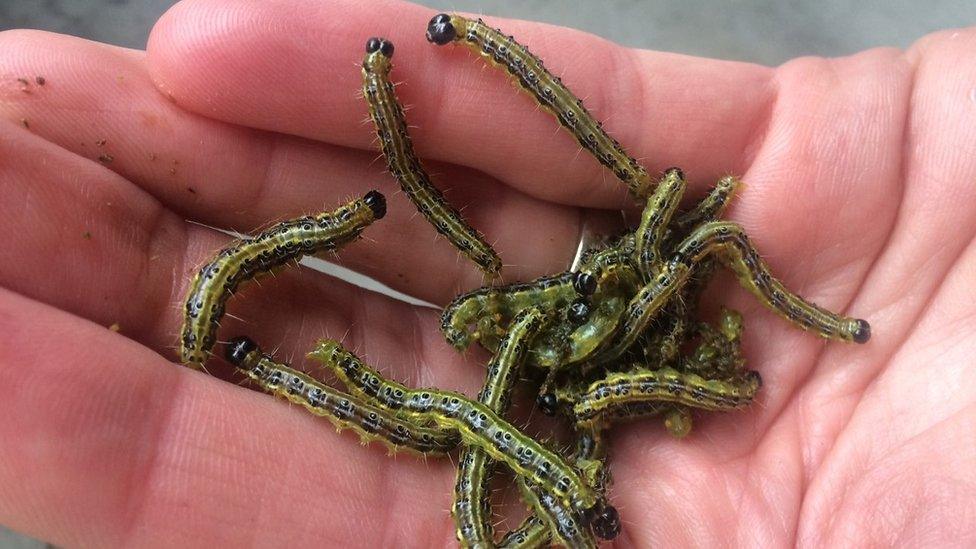Plagues of pests: When the bug population explodes
- Published
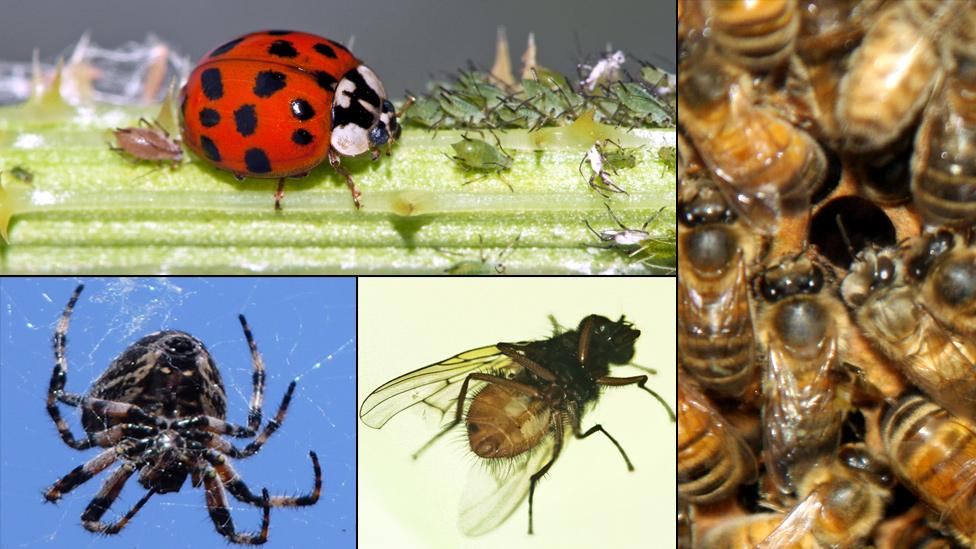
Insects, often too small to be much of a nuisance as individuals, suddenly seem to acquire a deliberate menace when they gang up with their mates. Sometimes weather conditions lead to increased numbers, other times the reason is more of a mystery - such as the current infestation in parts of Warwickshire and Derbyshire. But these are not the only places to have suffered from plagues of pests, as BBC News reveals.

Houseflies
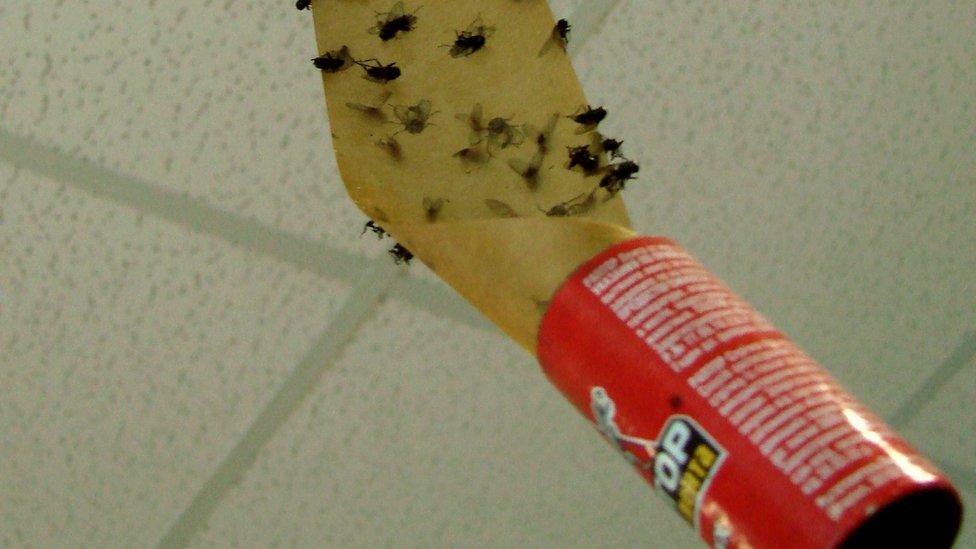
Flypaper alone wasn't enough to tackle the infestation in Warwickshire
Tribes of houseflies have been swarming through homes in parts of Warwickshire in recent weeks, leading some householders to develop new talents.
David Jones, from Brinklow, was pleased to report he managed to squash 35 flies in over an hour by pinging elastic bands.
Breaking this down, Mr Jones has a kill record of about one fly every two minutes. How time must have flown.
The county has also seen the resurrection of Just William-style catapults, external to attack the flies, and Venus flytraps to try to keep their numbers down.
However, it takes a Venus flytrap about 10 days to digest a fly, so a veritable forest would be needed to make much of a difference.

Venus flytraps and old-school catapults are being employed to frighten the flies
Faye Gaplin, who has a 10-month-old son, went for the heavy-handed approach and set off an industrial smoke bomb.
"When I came home there were 100 dead flies," she says.
Ms Gaplin presumably just swept up her haul, but could have mimicked Swedish artist Magnus Muhr, who uses dead flies in his photography, external.
Sean Lawson, Rugby Borough Council's head of environmental health, has the unenviable job of searching for any reasons for a surge in flies - such as piles of manure.
So far, though, this scatological game of cat and mouse is being won by the flies, as Mr Lawson hasn't stumbled across anything that could be responsible for the swarms.

Bees
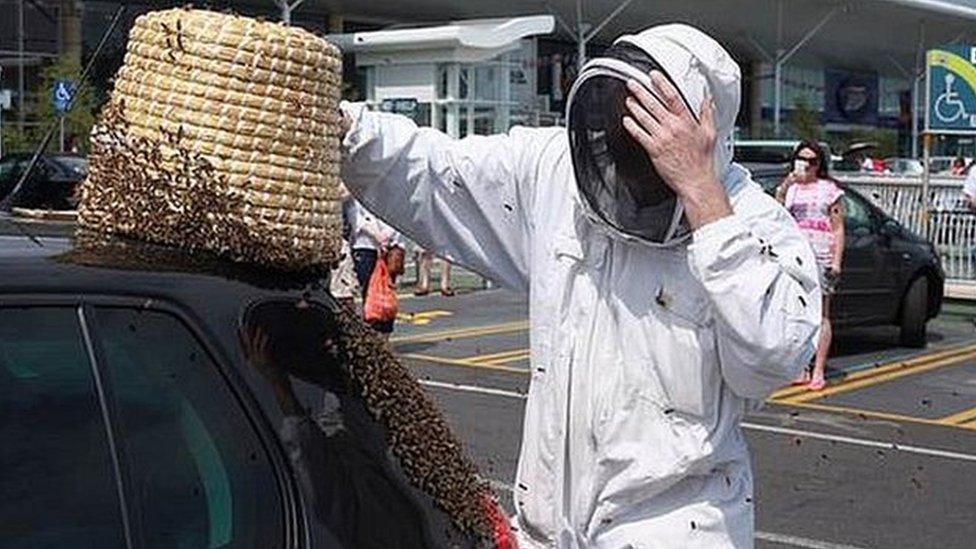
The basket thing is called a skep and is used to gather bees
A single bee puttering about is a delightful reminder of summer. A swarm of bees though, is an angry cloud of sting.
A parked car in the centre of Bournemouth became an unlikely magnet for thousands of honey bees in the summer of 2014.
An expert had to come and gather up the buzzing cloak which had spread across the car, which sadly, wasn't a Lotus.
The car's owner was not in the vehicle when the swarm turned up and since it wouldn't buzz off on its own, had to wait for it to be safely taken away.
It's possible to attract bees to gather on your chin, should you wish to have a "beard of bees", and it's a pastime that is fiercely competitive, external.
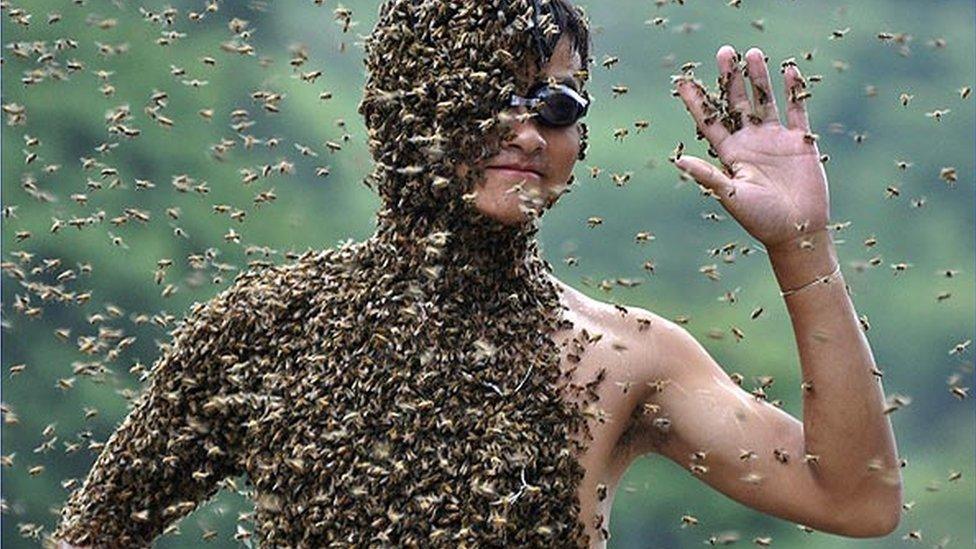
Don't try this at home...
The only specialist equipment needed to join in appears to be goggles, pants and a massive swarm of bees.
The East Dorset Beekeepers' Association says bees swarm when they've "laid a new queen in their previous colony and the old queen is accompanying her old bees to a new home".

Spiders
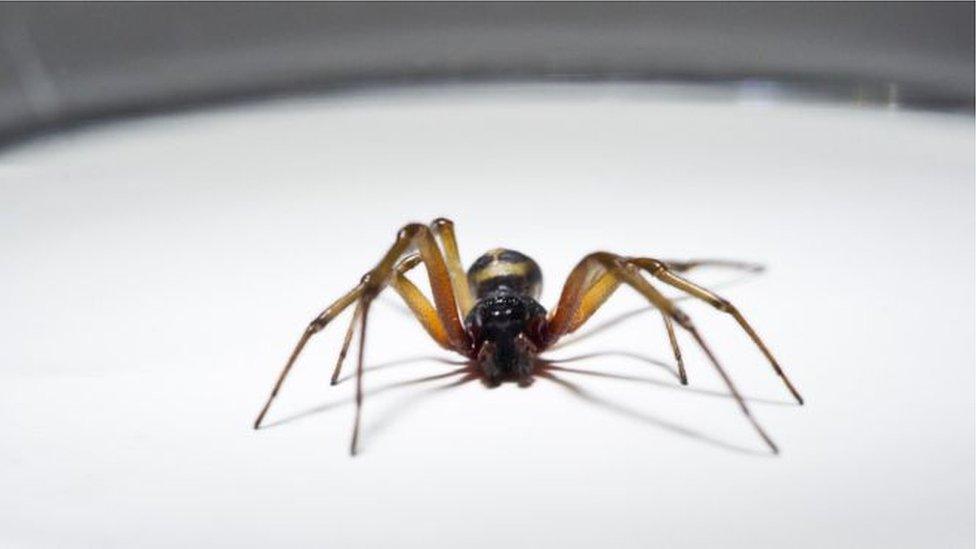
Incy wincy spider
Two east London primary schools were forced to close temporarily last November after being infested with false widow spiders - addressed in formal circles as Steatoda nobilis.
It's believed to have arrived in Britain from sunnier climes - sneaking into crates of fruit from the Canary Islands.
The first reported sighting was in Torquay in 1879.
According to the British Arachnological Society, false widows don't make nests, but "each individual makes a scaffold web with which it catches prey", which sounds chillingly organised and premeditated.
Poisoning from a spider bite is known as arachnidism, external, and false widows can give a nasty bite that can cause an allergic reaction in vulnerable people, although there are no reported deaths from its bite in the UK.
So Little Miss Muffett had no reason to be frightened after all.

Painted ladies
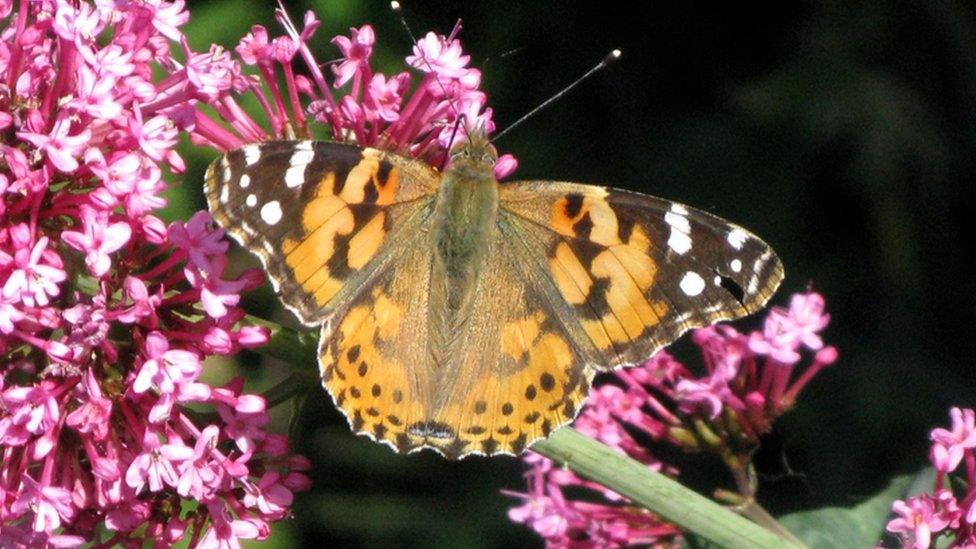
Painted ladies were seen in many gardens following mild weather in 2009
Painted ladies, the only insect to share a name with an old term for a prostitute, external, fluttered in huge numbers in the south-east of England in the summer of 2009.
Enthusiasts had a whale of a time, and in about 45 minutes counted nearly 3,000 - more than one per second.
If the conditions are right, the orange, black and white-spotted creatures come over from Africa in great numbers.
Enthusiasts should get their clickers out, as the next painted lady flurry is expected in 2017 or 2018.
There's a cheerful Irish saying that "butterflies are souls of the dead waiting to pass through purgatory".
Butterflies have given their name to cakes, external, kisses, external, knives, external and a way of slicing a leg of lamb., external

Ladybirds
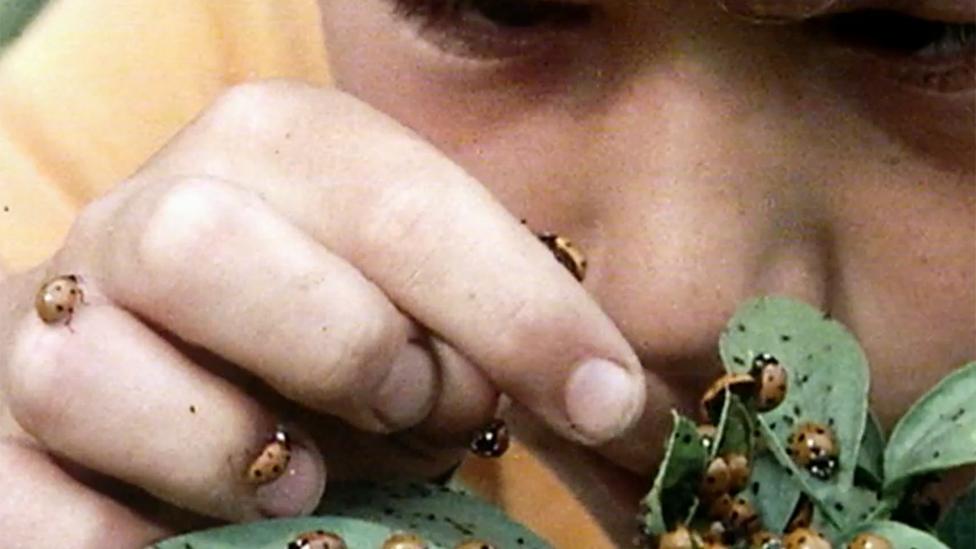
"Your house is on fire and your children have gone"
A plague of ladybirds descended on the long hot summer of 1976, with many people reporting being bitten by them.
The British Entomological and Natural History Society has estimated an enormous 23.65 billion of them were swarming on the southern and eastern coasts of England by late July.
Brenda Madgwick, who spent some of the summer on Kent's Isle of Sheppey, said it was like a crunchy carpet: "Everywhere one put one's foot, it was thick with ladybirds, external. The posts along the seafront holding up the chains were completely smothered.''
A warmer than average spring saw larger than usual populations of aphids, creating more food for ladybirds, say scientists. But the hot, dry summer meant plants matured and dried early, leaving the aphids without food. Their population collapse led to hungry ladybirds moving on in their billions, searching for nutrition.
No-one thought to simply tell them to go home because their house was on fire, external and the sole surviving child was, for some reason, hiding under a pan.

Flying ants
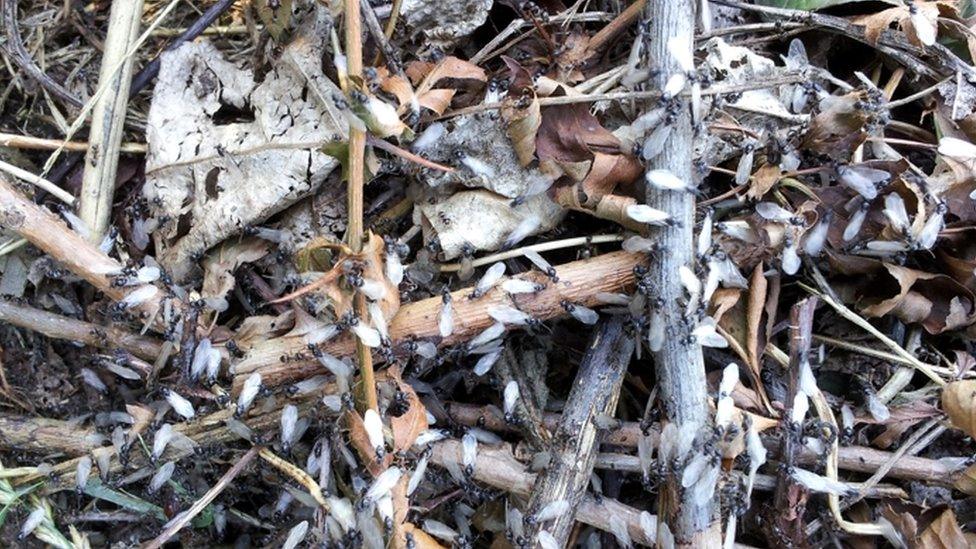
Flying ants swarm in an attempt to get noticed by the opposite sex
Swarms of flying ants are often seen across the UK in late summer.
Scientists say the sudden emergence of the black garden ants - known as Lasius Niger - is the insects' annual mating ritual.
As ants from thousands of colonies take to the skies at once, the number could be millions of millions - they swarm at the same time to maximise their chances of reproducing.
Dr Erica McAlister, manager of Diptera Collections at the Natural History Museum, said mating was the reason behind most fly swarms and this tended to start in spring when food resources were good.
She said some male midges tended to "anchor to a key post" in nature, making them most visible to females.
"This gives them more chances of mating," she said. How romantic.
- Published23 May 2016
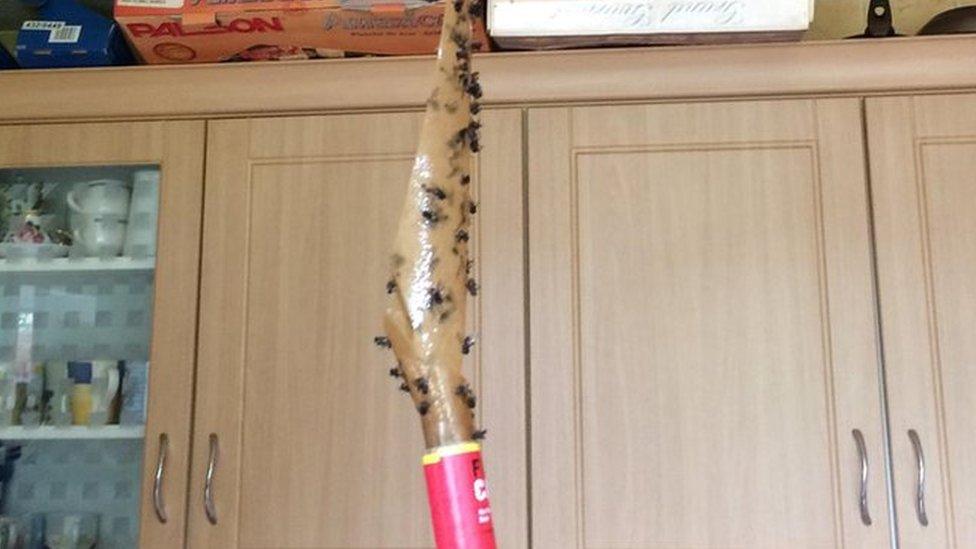
- Published5 March 2016
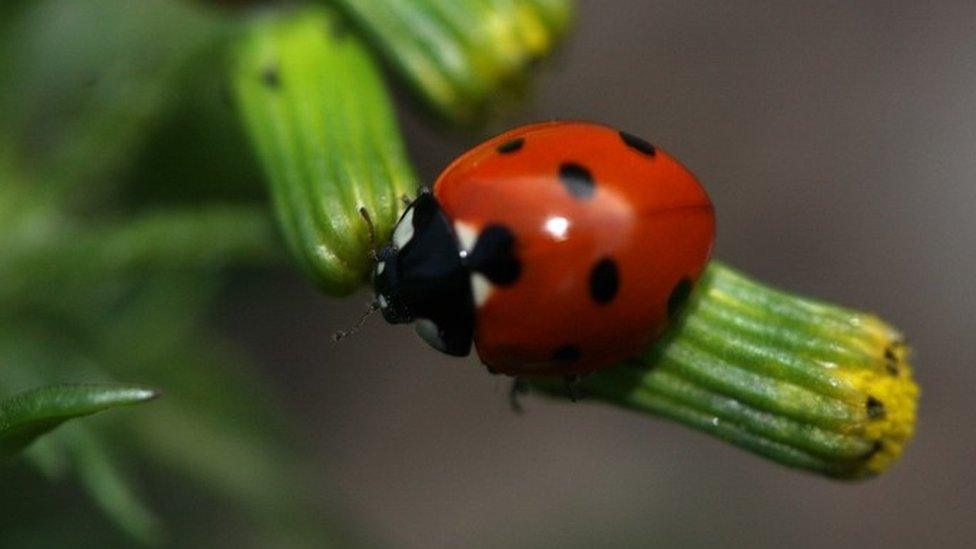
- Published8 February 2016

- Published13 November 2015
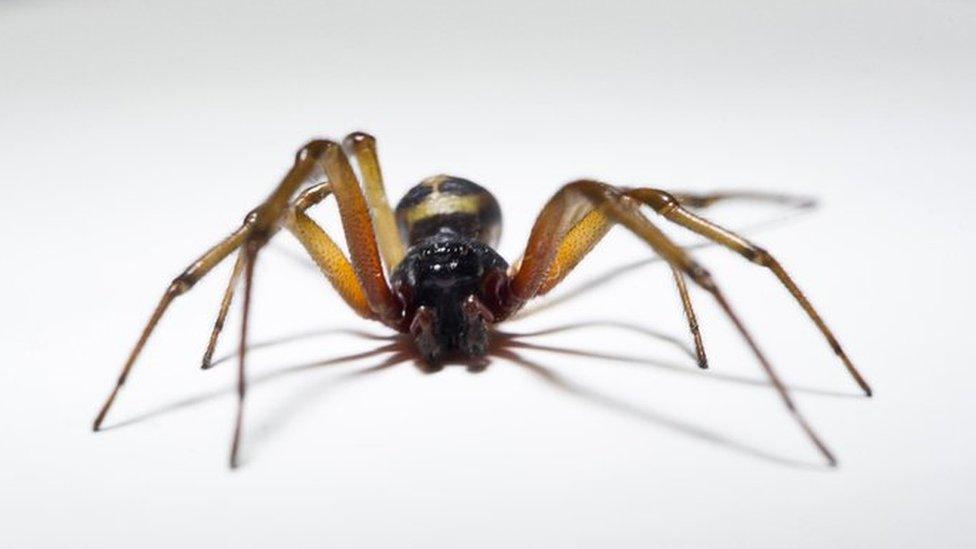
- Published26 August 2015
